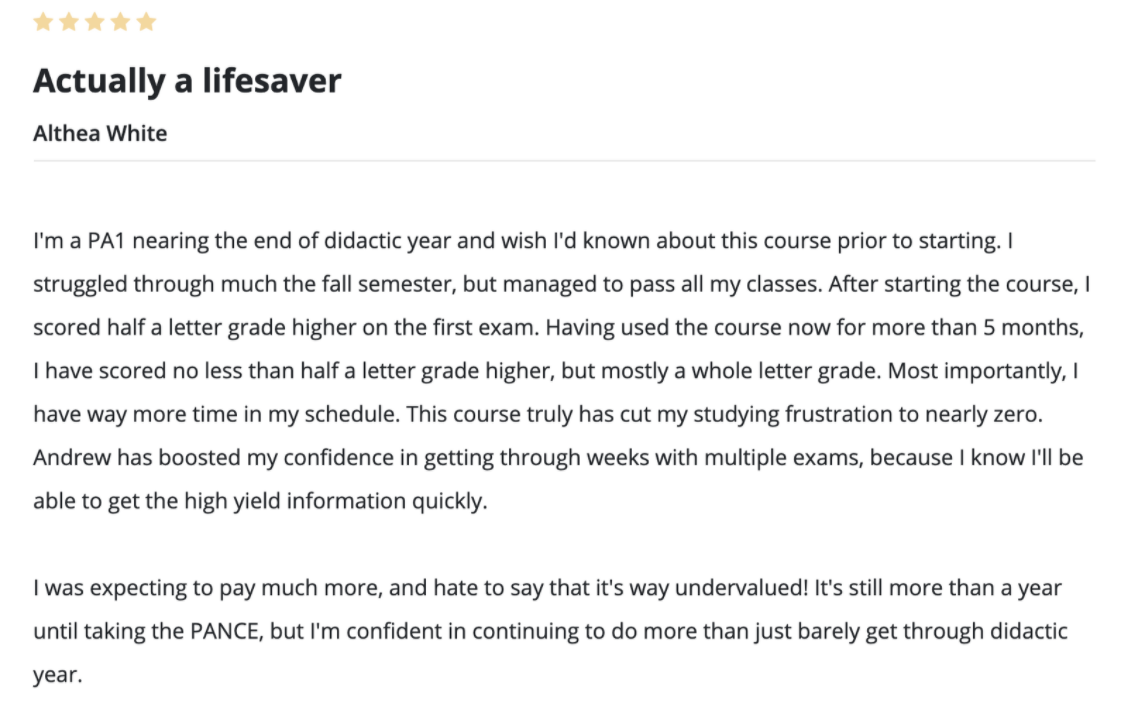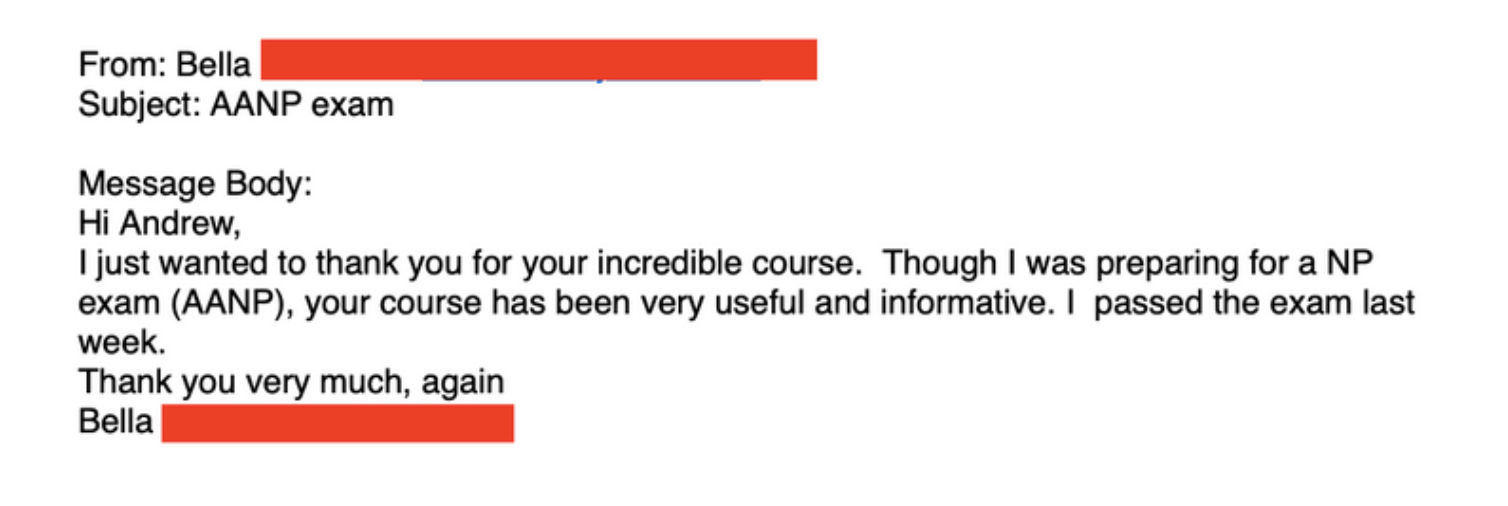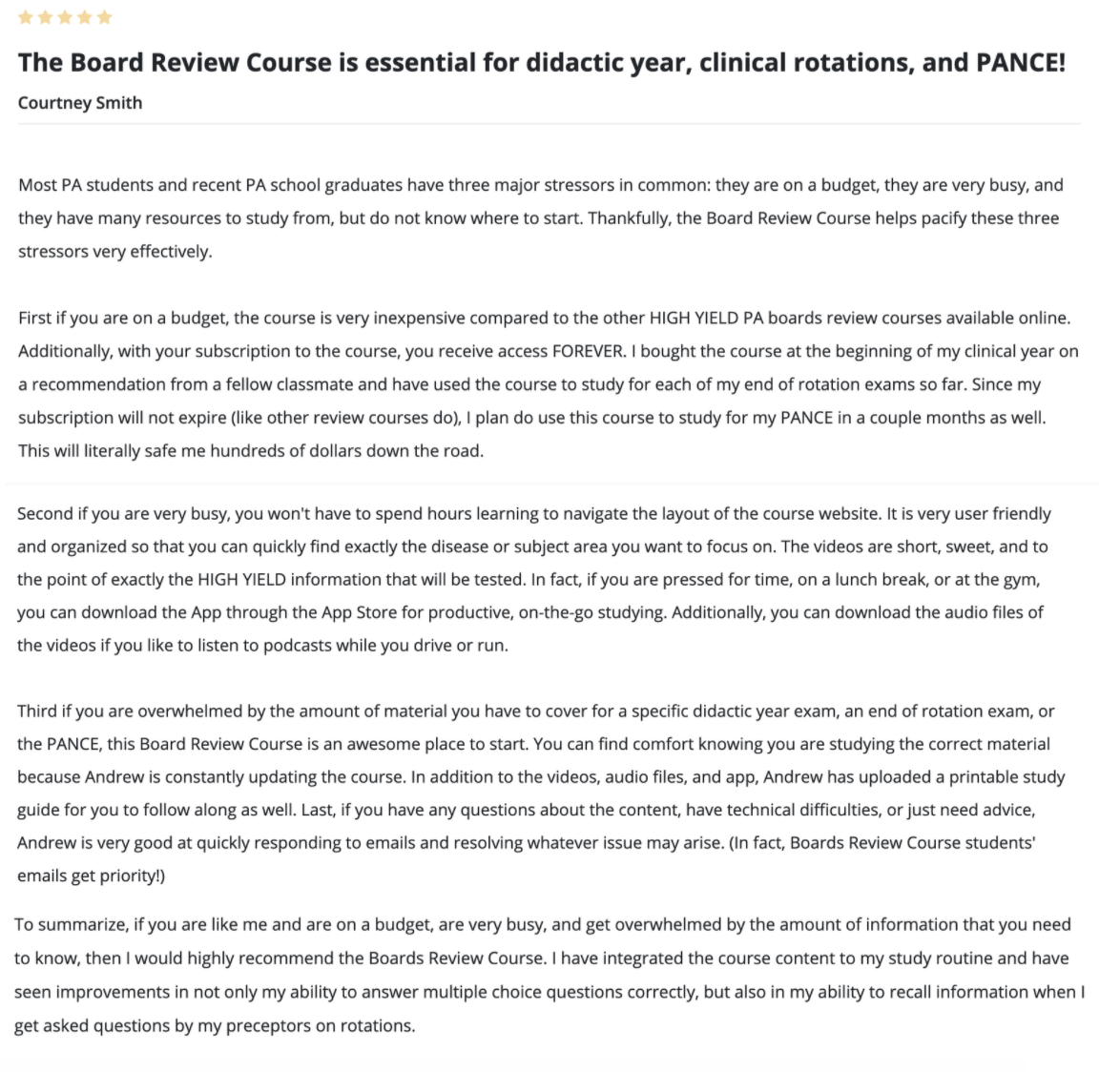
Medgeeks Board Review
2023 High-Yield Prep for PANCE, PANRE, & PANRE-LA
Designed for physician assistants who are preparing for the PANCE, PANRE, or PANRE-LA. Our curriculum is the perfect review for exams or as a refresher for those in practice. Our curriculum follows the NCCPA blueprint and focuses on the following:
History Taking and Performing The Physical Examination
General physical examination components and techniques
Pertinent historical information
Risk factors for the development of significant medical conditions
Significant physical examination findings
Signs and symptoms of significant medical conditions
Diagnostic and Laboratory Studies
Appropriate patient education relating to diagnostic and laboratory studies
Indications for initial and subsequent diagnostic and laboratory studies
Indications for preventive screening tests
Risks associated with diagnostic and laboratory studies
Reviewing and interpreting results of diagnostic and laboratory studies, and correlating the results with history and physical examination findings
Selecting appropriate diagnostic and/or laboratory studies
Formulating The Most Likely Diagnosis
Significance of diagnostic and laboratory studies as they relate to diagnosis
Significance of history as it relates to the differential diagnosis
Significance of physical examination findings as they relate to diagnosis
Developing multiple differential diagnoses for complicated and/or multisystem cases
Formulating most likely differential diagnoses
Incorporating history, physical examination findings, and diagnostic data into medical decision-making
Recognizing the need for referral to a specialist
Selecting the most likely diagnosis in light of presented data
Health Maintenance, Patient Education, and Preventive Measures
Appropriate patient education regarding preventable conditions and lifestyle modifications
Early detection and prevention of medical conditions
Human growth and development
Human sexuality and gender identity, gender transition, and associated medical issues
Immunization schedules and recommendations for infants, children, adults, and foreign travelers/adoptions
Impact of patient demographics on risks for medical conditions
Prevention of communicable diseases
Preventive screening recommendations
Conducting education on modifiable risk factors with an emphasis on primary and secondary prevention
Clinical Intervention
Clinical procedures and their indications, contraindications, complications, risks, benefits, and techniques
Conditions that constitute medical emergencies
Criteria for admission to or discharge from the hospital or other facilities
Management, treatment, and follow-up of medical conditions
Palliative care and end-of-life issues
Roles of other health professionals
Sterile technique
Therapeutic regimens
Universal precautions and special isolation conditions
Evaluating patient response to treatment/intervention
Formulating and implementing treatment plans in accordance with applicable practice guidelines
Making appropriate dispositions
Pharmaceutical Therapeutics
Adverse effects, reactions, and toxicities
Common alternative/complementary therapies and their interactions and toxicities
Contraindications
Drug interactions, including presentation and treatment
Indications for use
Mechanism of action
Methods to reduce medication errors
Monitoring and follow-up of pharmacologic regimens
Presentation and treatment of allergic reactions
Regulation of controlled substances
Applying Basic Scientific Concepts
Professional Practice and Legal/medical ethics
Medgeeks Board Review
Curriculum
Our program is comprised of 30 hours of high-yield review (video, audio, detailed notes, and study guides) covering diseases in every organ system. Each lecture will ensure you can confidently answer any exam question, such as:
- What is the most common sign, symptom, complication, etc.?
- What is the most likely diagnosis?
- What is the next best step?
- What is the best initial test?
- What is the most accurate test?
- What is the treatment of choice?
- What is second-line treatment?
Get your questions answered.
Although it’s a self-paced program, our instructors make themselves available Monday – Friday to answer any questions you may have.
Yearly updates.
Every year we make updates to the curriculum to ensure we stay current. You’ll get immediate access to every update at no additional charge.
Coronary Artery Disease
Hyperlipidemia
Hypertriglyceridemia
Stable Angina
Prinzmetal Angina
Peripheral Arterial Disease
Acute Coronary Syndrome
Cardiomyopathy
Dilated
Hypertrophic
Restrictive
Conduction Disorders
Atrial Fibrillation & Atrial Flutter
Heart Block
Supraventricular Tachycardia
Premature Beats
Ventricular Arrhythmias
Congenital Heart Disease
Cyanotic vs. Acyanotic
ASD
VSD
Patent Ductus Arteriosus
Coarctation of the Aorta
Tetralogy of Fallot
Transportation of the Great Vessels
Congestive Heart Failure
- Systolic Heart Failure
- Diastolic Heart Failure
- Late Stage Management
- Acute Exacerbation
Hypertension
- Primary Hypertension
- Secondary Hypertension
Hypotension
- Hypovolemic Shock
- Cardiogenic Shock
- Distributive Shock (sepsis, anaphylactic, or neurogenic)
- Obstructive Shock
- Orthostatic Hypotension
Traumatic, Infections, & Inflammatory Heart Conditions
- Bacterial Endocarditis
- Acute Pericarditis
- Pericardial Effusion
- Cardiac Tamponade
Valvular Disease
- Murmurs
- Mitral Stenosis
- Aortic Stenosis
- Mitral Regurgitation
- Aortic Regurgitation
- Mitral Valve Prolapse
- Tricuspid Regurgitation
- Tricuspid Stenosis
- Pulmonic Valve Stenosis
- Pulmonic Regurgitation
Vascular Disease
- Abdominal Aortic Aneurysm
- Aortic Dissection
- Arterial Embolism
- Vascular Insufficiency
Asthma & Acute Asthma Exacerbation
COPD
- Chronic Bronchitis
- Emphysema
Infectious Disease
- Pneumonia
- Tuberculosis
- Bronchiolitis/Respiratory Syncytial Virus
- Acute Bronchitis
- Acute Epiglottitis
- Croup
- Influenza
- Pertussis
- Cryptococcosis
- Histoplasmosis
Neoplasms
- Pulmonary nodule
- Small cell carcinoma
- Non-small cell carcinoma
- Carcinoid tumor (bronchial)
Pleural Disease
- Pleural Effusion
- Pneumothorax (Spontaneous)
- Pneumothorax (Tension)
Pulmonary Embolism & Deep Vein Thrombosis
Pulmonary Hypertension
- Group 1: Pulmonary Artery Hypertension
- Group 2: Left Heart Disease
- Group 3: Chronic Lung Disease and Hypoxemia
- Group 4: Chronic Thromboembolic Disease States
- Group 5: Unknown or Multifactorial Cause
Restrictive Pulmonary Disease
- Interstitial Lung Disease
- Sarcoidosis
Chest/Rib Disorders
- Pectus Excavatum “Sunken Chest”
- Pectus Carinatum
- Rib Fractures
Compartment Syndrome
Infectious Disease
- Osteomyelitis
- Septic Arthritis
Lower Extremity Disorders
- Avascular Necrosis
- Slipped Capital Femoral Epiphysis
- Developmental Dysplasia of the Hip
- Hip FractureKnee Dislocation
- ACL Tear
- PCL Tear
- Meniscal Tear
- Osgood-Schlatter Disease
- Ankle Sprain
- Maisonneuve Fracture
- Ankle Fracture
- Achilles Tendon Tear
Shoulder Disorders
- Shoulder Dislocations
- Rotator Cuff Tear
- AC Joint Injury
- Adhesive Capsulitis
- Proximal Humerus Fracture
- Midshaft Humerus Fracture
- Clavicle Fracture
Elbow Disorders
- Supracondylar Fracture
- Epicondylar Fracture
- Epicondylitis
- Nursemaid’s Elbow
- Elbow Dislocation
- Radial & Ulnar Fractures
- Radial Head Fracture
- Nightstick
- Colles Fracture
- Smith Fracture
Salter Harris Fracture
- Type 1
- Type 2
- Type 3
- Type 4
- Type 5
Hand & Wrist Disorders
- Scaphoid Fracture
- Carpal Tunnel Syndrome
- Boxer Fracture
- Mallet Finger
- Boutonniere Deformity
- Trigger Finger
- Ulnar Collateral Ligament Rupture of the Thumb
- Bennett Fracture
- Rolando Fracture
- De Quervain’s Tenosynovitis
Spinal Disorders
- Low Back Pain & Herniation
- Kyphosis
- Scoliosis
- Spinal Stenosis
- Ankylosing Spondylitis
- Compression Fracture
- Torticollis
Neoplasms
- Bone Tumors
- Ganglion Cyst
Osteoarthritis
Osteopenia & Osteoporosis
Paget’s Disease
Fibromyalgia
Gout
Calcium Pyrophosphate Dihydrate Deposition Disease (Psuedogout)
Juvenile Idiopathic Arthritis
Vasculitis
Polymyalgia Rheumatica
Polymyositis & Dermatomyositis
Reactive Arthritis
Rheumatoid Arthritis
Sjogren Syndrome
Systemic Lupus Erythematosus
Scleroderma
Psoriatic Arthritis
Biliary Disease
- Cholecystitis
- Cholelithiasis
- Choledocholithiasis
- Cholangitis
Colorectal Disorders
- Anorectal Abscess/Fistula
- Anal Fissure
- Constipation
- Diverticulosis/Diverticulitis
- Fecal Impaction
- Hemorrhoids
- Chrons Disease
- Ulcerative Cholitis
- Irritable Bowel Syndrome
- Intestinal Ischemia
- Bowel Obstruction
- Toxic Megacolon
- Colonic Polyps
- Colorectal Cancer & Screening
Esophageal Disorders
- Esophagitis
- GERD
- Mallory Weiss Tear
- Motility Disorders/Esophageal Strictures
- Esophageal Varices
Hepatic Disease
- Viral Hepatitis
- Cirrhosis
Small Intestine Disorders
- Appendicitis
- Celiac Disease
- Intussusception
Gastric Disorders
- Dyspepsia
- GastritisPeptic Ulcer Disease
- Pyloric Stenosis
Hernias
Infectious Diarrhea
Toxic Ingestion
Nutritional Deficiencies
Obesity
Food Allergies & Sensitivities
Neoplasms
- Esophageal Cancer
- Zollinger-Ellison Syndrome
- Gastric Adenocarcinoma
- Gastric Lymphoma
- Pancreatic neoplasm
- Liver neoplasm
Pancreatic Disorders
- Acute Pancreatitis
- Chronic Pancreatitis
Breast Disorders
- Breast Mass/Cancer
- Fibrocystic Disease
- Fibroadenomas
- Mastitis
- Breast Abscess
- Gynecomastia
- Galactorrhea
Uterine Disorders
- Uterine Leiomyoma
- Endometriosis
- Endometrial Cancer
- Pelvic Organ Prolapse
- Ovarian Disorders
- Ovarian Cysts
- Polycystic Ovarian Syndrome
- Adnexal Torsion
Cervical Disorders
- Cervical Cancer
- Vaginitis
- Cervix Insufficiency
- Infertility
- Menopause
- Menstrual Disorders
- Amenorrhea
- Dysmenorrhea
- Premenstrual Syndrome & Premenstrual Dysphoric Disorder
Trauma
- Sexual Assault
- Trauma in Pregnancy
Contraception
Uncomplicated Labor
- Normal Physiologic Changes in Pregnancy
- Prenatal Care
- Pregnancy Education
- First Trimester
- Second Trimester
- Third Trimester
- Labor
- Fetal Monitoring
- Induction
- Post-Partum
- Hospital Stay
- Follow Up Care
Complicated Pregnancy
- Gestational Diabetes
- Hypertension in Pregnancy
- Rh Incompatibility
- Abortion
- Ectopic Pregnancy
- Multiple Gestations
- Gestational Trophoblastic Disease
- Placenta Previa
- Placental Abruption
- Cervical Insufficiency (Incompetent Cervix)
Complicated Labor
- Labor Dystocia
- Shoulder Dystocia
- Breech Presentation
- Cord Prolapse
- Premature Rupture of Membranes
- Postpartum Hemorrhage
Acute Kidney Injury
- Pre-Renal
- Intra-Renal
- Post-Renal
- Acute Hemodialysis Indications
Chronic Kidney Disease
Glomerular Disease
- IGA Nephropathy
- Post-Streptococcal Glomerulonephritis
- Rapidly Progressive Glomerulonephritis
- Minimal Change Disease
- Focal Segmental Glomerulosclerosis
- Membranous Nephropathy
- Secondary Causes
Congenital/Structural Disorders
- Horseshoe Kidney
- Hydronephrosis
- Polycystic Kidney Disease (PKD)
- Renal Artery Stenosis
Fluid/Electrolyte Disorders
- Hyperkalemia
- Hypokalemia
- Hypernatremia
- Hyponatremia
Neoplasms
- Renal Cell Carcinoma
- Wilms Tumor (Nephroblastoma)
Bladder Disorders
- Incontinence
- Overactive Bladder
- Urinary Bladder Prolapse
Congenital & Acquired Abnormalities
- Cryptorchidism
- Peyronie’s Disease
- Vesicoureteral Reflux
Infectious Disorders
- Cystitis
- Pyelonephritis
- Epididymitis
- Orchitis
- Prostatitis
Testicular Disorders
- Testicular Torsion
- Hydrocele
- Varicocele
Neoplasms
- Bladder Cancer
- Penile Cancer
- Prostate Cancer
- Testicular Cancer
Nephrolithiasis
Penile Disorders
- Erectile Dysfunction
- Hypospadias/Epispadias
- Phimosis
- Paraphimosis
- Penile Fracture
Benign Prostatic Hypertrophy
Urethral Disorders
- Urethral Prolapse
- Urethral Stricture
Adrenal Disorders
- Adrenal Insufficiency
- Cushing’s Disease
Neoplasms
- Multiple Endocrine Neoplasia
- Thyroid Cancer
- Adrenocortical Carcinoma
- Aldosteronism
- Pheochromocytoma
Diabetes
- Type 1 Diabetes
- Type 2 Diabetes
Hypogonadism
Parathyroid Disorders
- Hyperparathyroidism
- Hypoparathyroidism
Thyroid Disorders
- Hyperthyroidism
- Hypothyroidism
- Thyroid Nodule
Pituitary Disorders
- Acromegaly/Gigantism
- Dwarfism
- Pituitary Adenoma
- Hyperprolactinemia
Headache
- Cluster Headache
- Migraine Headache
- Tension Headache
Traumatic Brain Injury
Cranial Nerve Palsies
- CN I: Olfactory nerve
- CN II: Optic nerve
- CN III, IV, VI: Eye movement
- CN V: Trigeminal nerve
- CN VI: Facial nerve (Bell’s Palsy)
- CN VIII: Vestibulocochlear nerve
- CN IX: Glossopharyngeal nerve
- CN X: Vagus nerve
- CN XI: Accessory nerve
- XII: Hypoglossal nerve
Peripheral Nerve Disorders
- Complex Regional Pain Syndrome (CRPS)
- Guillain-Barre Syndrome
Encephalitis
Meningitis
Movement Disorders
- Essential Tremor
- Parkinson Disease
- Huntington Disease
- Tourette Disorder
Neurocognitive Disorders
- Delirium
- Dementia
Neuromuscular
- Cerebral Palsy
- Multiple Sclerosis
- Myasthenia Gravis
Seizures
- Provoked vs Unprovoked
- Focal (Partial)
- Generalized
- Status Epilepticus
Vascular Disorders
- Arteriovenous Malformations (AVMs)
- Cerebral Aneurysm
- Subarachnoid Hemorrhage
- TIA
- Stroke
- Intracranial Hemorrhage
Syncope
- Neurally-mediated
- Orthostatic
- Cardiac
Coagulation Disorders
- Von Willebrand Disease
- Hemophilia
- Immune Thrombocytopenic Purpura
- Thrombotic Thrombocytopenic Purpura
Cytopenias
- Leukopenia/Neutropenia
- Macrocytic Anemia
- Microcytic Anemia
- Normocytic Anemia
- Thalassemia
Cytoses
- Polycythemia Vera
- Thrombocytosis
Hemoglobinopathies
- Hemochromatosis
- Sickle Cell Anemia
Transfusion Reaction
Neoplasms, Pre-malignancies, & Malignancies
- Chronic Lymphocytic Leukemia
- Chronic Myeloid Leukemia
- Acute Myeloid Leukemia
- Acute Lymphoblastic Leukemia
- Lymphoma
- Multiple Myeloma
- Myelodysplastic Syndrome
Anxiety Disorders
- Generalized Anxiety Disorder
- Panic Disorder
- Phobia
Bipolar Disorder
- Bipolar 1
- Bipolar 2
Depressive Disorders
- Major Depression
- Depression in pregnancy
- Minor Depression (other specified depressive disorder)
- Persistent Depressive Disorder (Dysthymia)
Disruptive, Impulse Control & Conduct Disorders
- Oppositional Defiant Disorder
- Conduct Disorder
- Antisocial Personality Disorder
- Intermittent Explosive Disorder
- Impulse Control Disorder
Dissociative Disorders
- Dissociative Amnesia
- Depersonalization/Derealization Disorder
- Dissociative Identity Disorder
Obsessive Compulsive Disorder
Neurodevelopmental Disorder
- Attention Deficit / Hyperactivity Disorder
- Autism Spectrum Disorder
Personality Disorder
- Paranoid
- Schizoid
- Schizotypal
- Histrionic
- Narcissistic
- Borderline
- Antisocial
- Avoidant
- Dependent
- Obsessive-compulsive
Schizophrenia
Sleep Wake Disorder
- Insomnia
- Sleep Walking
- Night Terrors
- Nightmares
- Narcolepsy
Somatic Symptom Disorder
- Somatic Symptom Disorder
- Conversion Disorder
- Factitious Disorder
- Malingering
Substance Abuse
- Alcohol
- Cannabis-Withdrawal Syndrome
- Caffeine Withdrawal
- Cocaine & Amphetamines
- Benzodiazepines & Barbiturates
- Opioids & Heroin
Trauma
- Post Traumatic Stress Disorder
- Adjustment Disorder
Bacterial Disease
- Botulism
- Rheumatic Fever
- Rocky Mountain Spotted Fever
- Tetanus
Parasitic Disease
- Helminths/Hookworms
- Enterobiasis/Pinworms
- MalariaToxoplasmosis
- Lyme Disease
Viral Disease
- Cytomegalovirus
- Rabies
- Epstein Barr Virus
- Zika Virus
Sexually Transmitted Diseases
- Herpes Simplex Virus Type 2
- Cervicitis
- Pelvic Inflammatory Disease
- HIV & AIDS
- Syphilis
Eye Disorders
- Conjunctivitis
- Cataract
- Corneal Abrasion/Ulcer
- Pterygium
- Dacryocystitis
- Blepharitis
- Ectropion/Entropion
- Hordeolum
- Optic Neuritis
- Papilledema
- Orbital Cellulitis
- Macular Degeneration
- Retinal Detachment
- Retinopathy
- Traumatic Hyphema
- Open Globe Injuries
- Retinal Vein Occlusion
- Retinal Artery Occlusion
- Amblyopia
- Strabismus
- Glaucoma
- Scleritis
Ear Disorders
- Cerumen Impaction
- Otitis Externa
- Barotrauma
- Vertigo
- Acoustic Neuroma
- Labyrinthitis
- BPPV
- Meniere’s Disease
- Cholesteatoma
- Acute Otitis Media
- Tympanic Membrane Perforation
- Hearing Loss
- Mastoiditis
- Tinnitus
Nose Disorders
- Epistaxis
- Nasal Polyps
- Nasal Trauma
- Allergic Rhinitis
- Rhinosinusitis
Oropharyngeal Disorders
- Dental Infections
- Gingivitis
- Aphthous Ulcers
- Recurrent Aphthous Stomatitis
- Oral Candidiasis
- Peritonsillar Abscess
- Pharyngitis
- Diphtheria
- Parotitis
- Leukoplakia
Acneiform Eruptions
- Acne Vulgaris
- Rosacea
- Folliculitis
Desquamation
- Erythema Multiforme
- Stevens-Johnson Syndrome (SJS) & Toxic Epidermal Necrolysis (TEN)
Diseases/Disorders of the Hair & Nails
- Alopecia
- Onychomycosis
- Paronychia
Exanthems
- Erythema Infectiosum (fifth disease)
- Hand-Foot-Mouth Disease
- Rubeola (Measles)
- Rubella (German Measles)
- Roseola Infantum
- Mumps
Infection of the Skin
- Cellulitis
- Erysipelas
- Impetigo
- Candidiasis
- Tinea pedis (Athlete’s Foot)
- Tinea cruris (Jock Itch)
- Tinea corporis (Ringworm)
- Tinea Capitis
- Pediculosis Capitis (Head Lice)
- Scabies
- Molluscum Contagiosum
- Varicella (Chicken Pox)
- Herpes Zoster (Shingles)
Keratotic Disorders
- Seborrheic Keratosis
- Actinic Keratosis
Neoplasms of the Skin
- Basal Cell Carcinoma
- Squamous Cell Carcinoma
- Melanoma
Papulosquamous Disorders
- Contact Dermatitis
- Eczema (Atopic Dermatitis)
- Lichen Planus
- Pityriasis Rosea
- Psoriasis
Pigment Disorders
- Vitiligo
- Melasma
Skin Integrity
- Burns
- Pressure Ulcers
- Stasis Dermatitis
Vesiculobullous Disease
- Bullous Pemphigoid
- Pemphigus Vulgaris
Other Dermatologic Disorders
- Urticaria
- Hidradenitis Suppurativa
- Acanthosis Nigricans
- Lipomas
- Epidermal Inclusion Cysts
- Pilonidal Disease
- Cherry Angioma
- Telangiectasis
High-Yield Case Studies
Every week we’ll go live to showcase brand-new interactive high-yield case studies. Our instructors will slowly tease out new information and will work through the case with you to enhance your critical thinking skills. This vignette-styled approach will increase retention to ensure you’re prepped for exams and rotations.
Can’t make a session? We record every case study and make them immediately available inside your dashboard.
You’ll also get access to our entire backlog of high-yield case studies totaling 100+ hours.
Your Instructors

Dr. Niket Sonpal
Niket Sonpal, M.D. practices internal medicine and is assistant professor of medicine at Touro Osteopathic School of Medicine, associate program director for the internal medicine residency program at Brookdale University hospital, director of Medical education at Picmonic, and chief strategy officer at Medquest Test Prep.

Clay Walker, PA-C
A graduate of the Southern Illinois University School of Medicine, Physician Assistant Program class of 2016. He currently works primary care and is the lead PA running the primary care residency program at Mayo Clinic.

Amanda Roy, PA-C
Amanda graduated from Pacific University’s PA program and recently earned her Doctor of Medical Science from Lincoln Memorial University. She is currently practicing primary care medicine in rural Oregon.
Medgeeks Board Review
What Clients Are Saying







